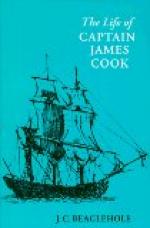A snowstorm.
On 16th January, Banks, Solander, Buchan, Green, Monkhouse, two seamen, and Banks’s two coloured servants, tried to get up the hills to see something of the surrounding country, but they found their progress hampered by the dwarf vegetation. To add to their discomfort a heavy snowstorm came on. Several of the party experienced that desire to sleep which is produced by cold, and were warned by Solander of the danger of giving way to it, yet he was almost the first one to give in, and was with great difficulty kept awake. Buchan, most unfortunately, had a fit, so a large fire was made at the first convenient spot, but a sailor and the two coloured men lagged behind. During the night the sailor was heard shouting, and was brought in to the fire, but in the morning the two coloured men were found frozen to death. Cook attributed their death to overindulgence in spirits, the supply for the party being left in their charge. Not intending to remain away the night, supplies ran short, so a vulture was shot and carefully divided amongst them, each man cooking his own, which amounted to about three mouthfuls. At length the weather cleared up and a start back was made, and after three hours they struck the beach, only to find they had never been any great distance away but had been describing a circle and came back almost to the place whence they had started. Banks notes the vegetation as more exuberant than he expected; the dominant colour of the flowers, white; and he collected wild celery and scurvy grass in large quantities, which was mixed with the food on board ship as long as it could be preserved in a wholesome condition. Whilst at the Bay of Success the guns were lowered into the hold so as to allow more room on deck for working the ship in the bad weather they expected to encounter when rounding the Horn.
The balance of the globe.
On 27th January Cape Horn was passed, but owing to fog and contrary wind they did not approach very closely, so they were unable to fix its exact position, but the description they were able to give of its appearance (there is a sketch of it by Mr. Pickersgill, Master’s mate, in the Records Office), and twenty-four observations taken in the immediate neighbourhood, settled any doubts they may have had, and Cook puts it at 55 degrees 53 minutes South, 68 degrees 13 minutes West, and Wharton gives the corrected position as 55 degrees 58 minutes South, 67 degrees 16 minutes West. Three days after they reached their furthest south, according to Cook 60 degrees 4 minutes South, 74 degrees 10 West, and the course was then altered to West by North. The continuous and careful observations of the state of the sea, and the absence of currents during the following month, caused Cook to come to the conclusion that the vast southern continent so long supposed to exist somewhere in that part of the globe, and by some people esteemed necessary to preserve its balance, was non-existent. Banks expresses his pleasure in having upset this theory, and observes: “Until we know how the globe is fixed in its position, we need not be anxious about its balance.”




